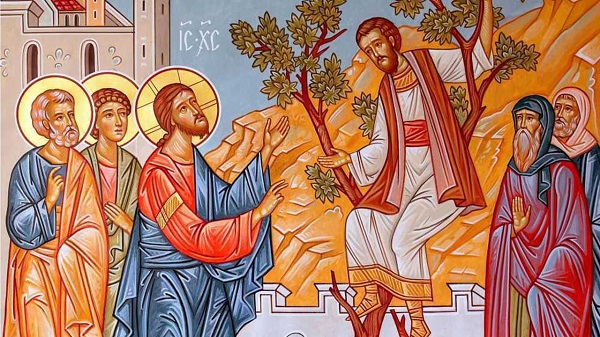Zacchaeus, a Moving Example of Repentance
22 January 2023In today’s Gospel reading, we hear that Jesus entered Jericho and was going through the town. There was a man there called Zacchaeus.
Zacchaeus was a chief tax-collector by profession. This was a job identified in people’s minds with deceit, theft and lies. At that time, the chief tax-collectors were reliable servants of the Roman state. In the pursuance of their duty of ensuring that taxes were paid, they managed to enrich themselves in a number of permissible and impermissible ways, at the expense of Jews who were poor. By this method, Zacchaeus became rich and acquired a great many material goods. He wasn’t a person for whom other people felt admiration, love and respect. He was someone who exploited his fellows. His relations with them were hypocritical and based on his own advantage.
However, a small spark ignited a conflagration within him. He could no longer live in sin. He saw that riches and material pleasures didn’t bring him happiness. His great desire was to meet Christ. He couldn’t see Him, though, because he was of such small stature and was unable to force his way through the press of people, despite his high social status. So he decided to climb up into a sycamore tree, so as to be able to see Him. He was unconcerned with the comments people made about this action. He’d heard that Christ embraced the righteous and the unrighteous. He recognized his estrangement from God, realized his error and sought a way to approach our Lord Jesus Christ without holding back.

As He entered the town, Jesus regarded the crowds of people with a look that was commanding, but paternal and merciful. His gaze immediately fell upon Zacchaeus, who was up the tree. The Lord called him by his name. This personal call from Jesus to Zacchaeus indicates his personal preparation for his salvation. He descends, full of happiness and joy, and welcomes the Redeemer of the world. He publicly acknowledged the error of his ways and promised to reform, by giving half his substance to the poor and restoring fourfold to anyone he had wronged. ‘Behold, Lord, the half of my goods I give to the poor; and if I have defrauded any one of anything, I restore it fourfold’. This divine call and this communication with God is what all of us experience within the Holy Church. Essentially, the Lord visited Jericho for the sake of this sinful man.
What we need to pay attention to in the case of Zacchaeus is that it’s often the mockery and derision, the hollow and false words that, more than anything, prevent us from searching for God. Let’s listen to the voice of Saint John from Karpathos, who says: ‘See yourself through the filter of Jezebel, the main features of which are thoughts of pride and vain glory. You’ll be able to overcome these if you count your soul as nothing, if you mock it and cast yourself down before the Lord, calling upon Him to help you. And if you recognize that gifts are from heaven’.
When the Lord entered the house of Zacchaeus, salvation came to his family: ‘Today salvation has come to this house’. From avaricious, the Lord had made him charitable, from an enemy of God into a lover of God, from an inhospitable person into a welcoming one, and from a sinner He made him into a repentant image of God. Zacchaeus recognized the Lord, he confessed his sin, confirmed his repentance and altered his way of life. Unfortunately, some of those who were present on the occasion of the Lord’s entry into the house of Zacchaeus were shocked and protested. They were shocked that Jesus should stay in the house of a sinner. They couldn’t understand how Jesus would go to the house of this sinner. But the judgments of people are a long way from those of God. The Lord sees our hearts and realized that Zacchaeus wasn’t satisfied with the life he was living and was seeking an opportunity to repent. Christ’s entry into his house seemed to him like a hand outstretched to someone in need of help. The Lord looked into the depths of Zacchaeus’ soul, which is why He didn’t condemn him for the transgressions he’d committed thus far. He gave him the opportunity to put things right. The measure of true repentance is apparent from the extent to which each person is open to it and from their willingness to withdraw from the earthly concerns which surround them. Through this repentance he was deemed worthy to be enlisted into the choir of the Saints of our Church.
May we keep the example of the chief tax-collector Zacchaeus rooted deeply in our conscience, aware that even the most sinful of people can be saved. His example shows us the right path. God gives us no few opportunities to repent, He wants our salvation and declared that He came ‘not to call the just, but sinners’. But we mortal and finite creatures persist in sin. We’re firmly attached to sensual and material pleasures, which block our path to the Kingdom of God and to any personal communion with God.
Let each of us ask if we really desire to be saved, and whether we want to gain the gifts of Paradise. Let us, too, imitate the repentance of Zacchaeus.






